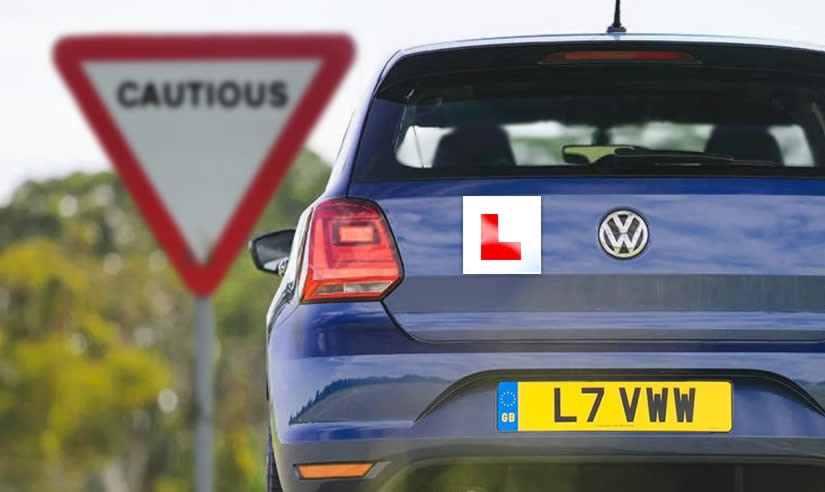Failed Driving Test for Being Too Cautious
Failed Driving Test for Being Too Cautious
If you’ve failed the driving test for being too cautious, it means you’ve been overly hesitant and have failed d through undue hesitation. DVSA driving test examiners are quite tough on test candidates who display excess hesitancy.
Examiners like to see cautious test candidates, but those that are overly hesitant will make the examiner think that they’re unsure what needs to be done and that they display a lack of confidence in their ability to drive.
Each year thousands of driving tests are failed due to learner drivers being too cautious. If you failed the driving test for being too cautious, it means you were overly hesitant on too many occasions resulting in multiple minor faults or a single issue occurred that resulted in a serious fault.
The reason that driving tests are failed for overly cautious test candidates is that their actions can cause other drivers to become impatient which may result in them making a hazardous manoeuvre. Detailed are the most common reasons why examiners fail test candidates based on being too hesitant.
Being Too Cautious at Roundabouts
Roundabouts can be challenging even for fully qualified drivers. As you approach a roundabout, you should be looking to see if it’s clear to continue onto it without having to stop. Approaching traffic (from your right) isn’t always observable until you get to the roundabout junction line and in such cases, you should stop.
However, if the roundabout is observable before you get to the junction line and there’s no traffic approaching from the right, you should avoid stopping as this is hazardous. Many collisions occur due to drivers unnecessarily stopping at a roundabout.
Another common test failure is being too hesitant when moving off the junction line into a roundabout after stopping. This can be particularly challenging for learner drivers who might lack confidence to get the car moving quickly on a busy roundabout. If driving a manual, it requires a good level of clutch control and the ability to confidently judge other traffic.
Being Too Cautious to Overtake
A failed driving test for being too cautious often involves cyclists and technically, it’s often marked as ‘failing to make progress’. You should always be cautious around cyclists and stay back if it’s deemed too hazardous to pass. However, an examiner will expect you to make progress and overtake a cyclist when it’s safe to do so.
Many driving tests are failed due to test candidates being too hesitant and not overtaking when the opportunity arises. Assess the road ahead to ensure it’s legal to cross the centre line and be cautious of any junctions up ahead. Ensure you have enough time to pass the cyclist safely and always leave at least 1 metre gap when passing.
Driving Too Slowly
Driving too slowly again comes down to ‘failing to make progress’ and is something that frequently annoys driving examiners. Just because there might be a speed limit in place doesn’t always mean it’s safe to do that speed. But, examiners do prefer test candidates to keep up with the flow of traffic and abide by the speed limit if it’s safe to do so.
How to Avoid Being Too Cautious
There’s a fine balance between being cautious and undue hesitation and it all comes down to forward planning. Forward planning is about taking notice of what’s around so that you can act on what you see before you get there.
As you start out learning to drive, forward planning is something your instructor does on your behalf and verbally prompts you with instructions. To become proficient, forward planning while driving takes many years experience, but as you reach test standard, you should have a sufficient ability so that you know what to do in most situations, often before you arrive there.
Forward planning involves several skills and must be completed in the following order: concentration, observation, anticipation and planning.

Today, I failed my driving test for not overtaking a van in the left-hand lane on a bypass. I understand the potential for danger when refusing to overtake on a normal single-lane (e.g. with a cyclist or tractor, etc.), but the same danger isn’t posed on a bypass.
I’d reached 70mph multiple times on bypasses throughout the test, and changed lanes, so it was clear I was confident to do these things – I just felt it would be better and less cocky to show some caution and not overtake when actually unnecessary. They make a big deal about being in the normal driving lane (left).
Pretty harsh, I thought. I was heading back to my test centre at the time, about 5 minutes away. I’d have passed if it weren’t for that.
Hi Amy,
Driving examiners do like test candidates to make progress where safe and legally permitted, but if you had already demonstrated that you are confident in overtaking on a dual carriageway and as you were on a dual carriageway, I would then assume that you weren’t holding traffic by up remaining behind the van, then yes, it does seem rather harsh. Examiners do vary considerably (regardless of what some might say). Whilst that was deemed a test fail for that examiner, another might not have had an issue with it.